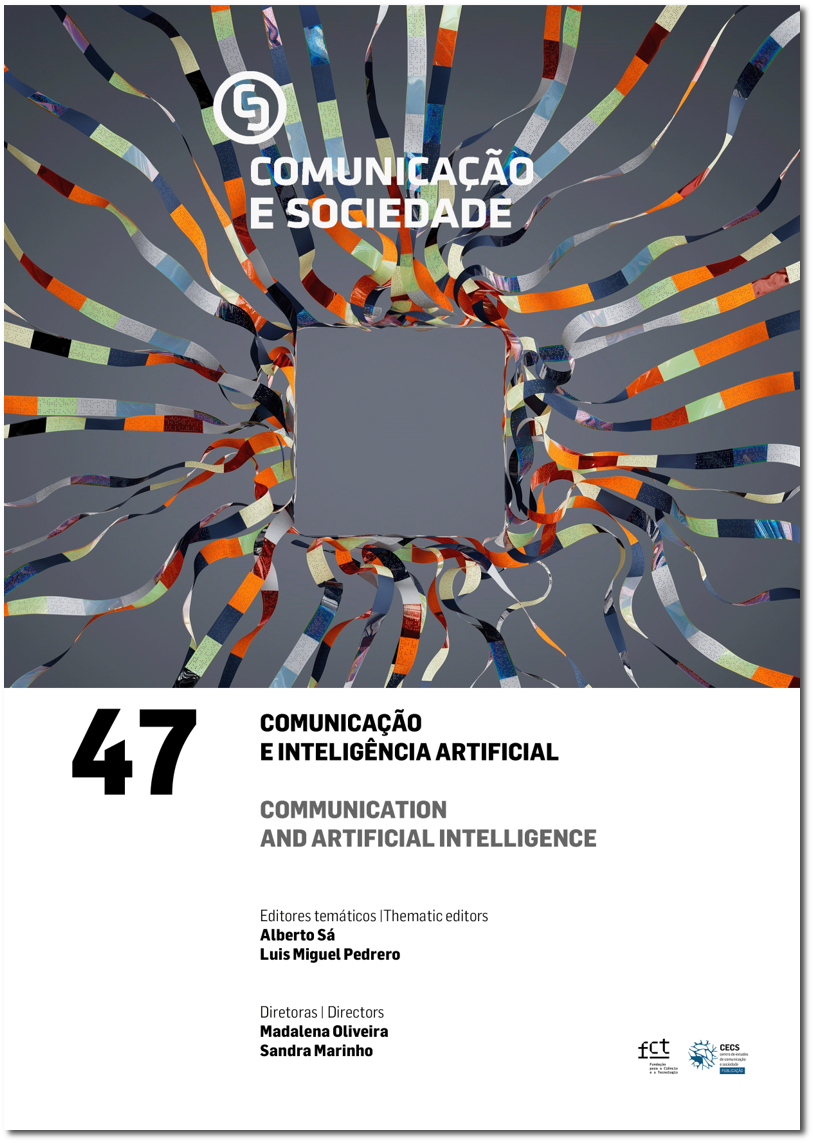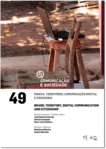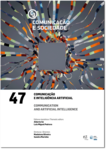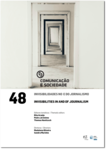Grounded Theory e Mídia Sociais: Práticas Metodológicas Hard, Medium ou Light?
DOI:
https://doi.org/10.17231/comsoc.47(2025).5950Palavras-chave:
mídia social, grounded theory, método, critérios, pesquisa qualitativaResumo
Dada a crescente influência das plataformas de mídia social, é essencial estabelecer uma estrutura de pesquisa que incorpore uma abordagem qualitativa e utilize a grounded theory (GT) para entender os fenômenos associados aos dados e conteúdo das mídia sociais. Este estudo teve como objetivo classificar o uso da GT em pesquisas envolvendo mídia sociais durante o processo de investigação. Por meio de uma revisão sistemática baseada nas principais abordagens do método, foi analisada a aplicação dos procedimentos da GT em 22 artigos que abordam conteúdos relacionados a mídia sociais. Esses estudos foram classificados como “hard”, “medium” ou “light”, com base no nível metodológico de detalhes. Os resultados das análises demonstraram que o uso da GT de forma hard e medium ocorreu em nove artigos cada e quatro aplicaram o método de maneira light. A GT é mais comumente usada como uma ferramenta de análise de dados do que para desenvolvimento de teoria. Em alguns casos, os autores forneceram apenas detalhes metodológicos parciais e, por vezes, as descrições não eram claras, comprometendo potencialmente a transparência e o rigor da pesquisa qualitativa. Este estudo encoraja os pesquisadores a refletir sobre o processo de GT e promove a aplicação do método na pesquisa em mídia social, ao discutir processos e necessidades. Também informa os pesquisadores sobre os desafios da aplicação de GT em pesquisas relacionadas à mídia social. Ao fornecer uma estrutura alternativa robusta para análise de critérios, buscamos dar suporte ao desenvolvimento de novas teorias substantivas ou formais e à codificação sistemática de dados, fomentando estudos futuros que contribuam para a disseminação da GT como um método. A aplicação da GT a dados de mídia social continua sendo um campo pouco explorado, com potencial significativo para investigação posterior.
Downloads
Referências
Aguinis, H., & Solarino, A. M. (2019). Transparency and replicability in qualitative research: The case of interviews with elite informants. Strategic Management Journal, 40(8), 1291–1315. https://doi.org/10.1002/smj.3015
Andre, L. (2023, 24 de fevereiro). 53 important statistics about how much data is created every day. FinancesOnline. https://financesonline.com/how-much-data-is-created-every-day/
Aria, M., & Cuccurullo, C. (2017). Bibliometrix: An R-tool for comprehensive science mapping analysis. Journal of Informetrics, 11(4), 959–975. https://doi.org/10.1016/j.joi.2017.08.007
Barber, C. S., & Bettez, C. B. (2020). Exposing patterns of adult solicitor behaviour: Towards a theory of control within the cybersexual abuse of youth. European Journal of Information Systems, 30(6), 591–622. https://doi.org/10.1080/0960085X.2020.1816146
Barré, G. (2017). Conformity through the mobile phone choices of the young French. Quality & Quantity, 51(1), 47–63. https://doi.org/10.1007/s11135-015-0293-y
Bittencourt, M. (2017). Grounded theory como metodologia para o estudo das mídias digitais. Comunicação & Sociedade, 39(1), 143–167.
Bolat, E., Kooli, K., & Wright, L. T. (2016). Businesses and mobile social media capability. Journal of Business & Industrial Marketing, 31(8), 971–981. https://doi.org/10.1108/JBIM-10-2016-270
Bonfim, L. (2020). Spanning the boundaries of qualitative grounded theory methods: Breaking new grounds into the new online era. RAUSP Management Journal, 55(4), 491–509. https://doi.org/10.1108/RAUSP-04-2019-0061
Bridges, E., & Hofacker, C. F. (2016). Service marketing and adoption of promotional technology: A qualitative study. Service Science, 8(4), 368–385. https://doi.org/10.1287/serv.2016.0144
Braun, V., & Clarke, V. (2013). Successful qualitative research: A practical guide for beginners. SAGE.
Charmaz, K. (2009). A construção da teoria fundamentada: Guia prático para análise qualitativa (J. E. Costa, Trad.). Artmed; Bookman. (Trabalho original publicado em 2006)
Corbin, J. M., & Strauss, A. (1990). Grounded theory research: Procedures, canons, and evaluative criteria. Qualitative Sociology, 13(1), 3–21. https://doi.org/10.1007/BF00988593
Corbin, J. M., & Strauss, A. (2015). Basics of qualitative research: Techniques and procedures for developing grounded theory. SAGE.
Correa, S. C. H., & Gosling, M. S. (2020). Destinos turísticos inteligentes na avaliação de pesquisadores e de profissionais do turismo nos setores público e privado. Revista Hospitalidade, 17(2), 71–94. https://doi.org/10.21714/2179 9164.2020.v17n2.005
Cowan, R. L., & Horan, S. M. (2021). Understanding information and communication technology use in workplace romance escalation and de-escalation. International Journal of Business Communication, 58(1), 55–78. https://doi.org/10.1177/2329488417731860
Creswell, J. W. (2013) Qualitative inquiry and research design. SAGE.
Davis, R., Piven, I., & Breazeale, M. (2014). Conceptualizing the brand in social media community: The five sources model. Journal of Retailing and Consumer Services, 21(4), 468–481. https://doi.org/10.1016/j.jretconser.2014.03.006
Gephart, R. P., Jr. (2004). From the editors – Qualitative research and the Academy of Management Journal. Academy of Management Journal, 47(04), 454–462. https://doi.org/10.5465/amj.2004.14438580
Gioia, D. A., Corley, K. G., & Hamilton, A. L. (2013). Seeking qualitative rigor in inductive research: Notes on the Gioia methodology. Organizational Research Methods, 16(1), 15–31. https://doi.org/10.1177/1094428112452151
Glaser, B., & Strauss, A. (1967). The discovery of grounded theory: Strategies for qualitative research. Sociology Press.
Grover, A., Foreman, J., & Burckes-Miller, M. (2016). “Infecting” those we care about: Social network effects on body image. International Journal of Pharmaceutical and Healthcare Marketing, 10(3), 323–338. https://doi.org/10.1108/IJPHM-09-2014-0052
Halaweh, M. (2018). Integrating social media and grounded theory in a research methodology: A possible road map. Business Information Review, 35(4), 157–164. https://doi.org/10.1177/0266382118809168
Harley, B., & Cornelissen, J. (2022). Rigor with or without templates? The pursuit of methodological rigor in qualitative research. Organizational Research Methods, 25(2), 239–261. https://doi.org/10.1177/1094428120937786
Heath, H., & Cowley, S. (2004). Developing a grounded theory approach: A comparison of Glaser and Strauss. International Journal of Nursing Studies, 41(2), 141–150. https://doi.org/10.1016/S0020-7489(03)00113-5
Hu, T. E., Luo, X., Dai, H., Zhang, X. (2021). Developing a value assessment framework of habitual social media use: A grounded theory approach. Journal of Electronic Commerce Research, 22(2), 128–154.
Huang, Z., Ouyang, J., Huang, X., Yang, Y., & Lin, L. (2021). Explaining donation behavior in medical crowdfunding in social media. SAGE Open, 11(2), 1–12. https://doi.org/10.1177/21582440211014520
Jenkins, B. M., & Cramer, E. M. (2022). Capturing injustice: The screenshot as a tool for sousveillance. Howard Journal of Communications, 33(4), 412–433. https://doi.org/10.1080/10646175.2022.2032884
Kalhour, M., & Ng, J. C. Y. (2016). The dark side of social media game: The addiction of social gamers. Economia e Política Industriale, 43(2), 219–230. https://doi.org/10.1007/s40812-016-0025-x
Kaplan, A. M., & Haenlein, M. (2010). Users of the world, unite! The challenges and opportunities of social media. Business Horizons, 53(1), 59–68. https://doi.org/10.1016/j.bushor.2009.09.003
Kazemian, S., & Grant, S. B. (2021). The impact of the COVID-19 pandemic on knowledge sharing in UK higher education. VINE Journal of Information and Knowledge Management Systems, 54(1), 74–107. https://doi.org/10.1108/VJIKMS-06-2021-0096
Ketokivi, M., & Mantere, S. (2021). What warrants our claims? A methodological evaluation of argument structure. Journal of Operations Management, 67(6), 755–776. https://doi.org/10.1002/joom.1137
Lagrosen, S., & Josefsson, P. (2011). Social media marketing as an entrepreneurial learning process. International Journal of Technology Marketing, 6(4), 331–340. https://doi.org/10.1504/IJTMKT.2011.045912
Lai, L. S. L., & To, W. M. (2015). Content analysis of social media: A grounded theory approach. Social Media Content Analysis, 16(2), 138–152.
Lanka, E., Lanka, S., Rostron, A., & Singh, P. (2021). Why we need qualitative research in management studies. Revista de Administração Contemporânea, 25(2), e-200297. https://doi.org/10.1590/1982-7849rac2021200297.en
Lauricella, S., & Pankhurst, K. L. (2018). The safe tweet: Social media use by Ontario fire services. International Journal of Emergency Services, 7(3), 179–191. https://doi.org/10.1108/IJES-09-2017-0048
Leonard, A., & van Zyl, D. (2014). Social relationships in IT project teams: Its role, complexity and the management thereof. International Journal of Information Systems and Project Management, 2(1), 21–39. https://doi.org/10.12821/ijispm020102
Li, Y., & Voida, A. (2022). Nonprofit organizations’ dialogic use of social media: Principles and practice. Journal of Nonprofit & Public Sector Marketing, 36(1), 65–90. https://doi.org/10.1080/10495142.2022.2133059
Liu, Z. J., Chernov, S., & Mikhaylova, A. V. (2021). Trust management and benefits of vehicular social networking: An approach to verification and safety. Technological Forecasting and Social Change, 166, Artigo 120613. https://doi.org/10.1016/j.techfore.2021.120613
Locke, K. D. (2001). Grounded theory in management research. SAGE.
Morse, J. M., Bowers, B. J., Charmaz, K., Clarke, A. E., Corbin, J., & Stern, P. N. (2016). Developing grounded theory: The second generation. Routledge. https://doi.org/10.4324/9781315430577
Murphy, C., Klotz, A. C., & Kreiner, G. E. (2017). Blue skies and black boxes: The promise (and practice) of grounded theory in human resource management research. Human Resource Management Review, 27(2), 291–305. https://doi.org/10.1016/j.hrmr.2016.08.006
Nguyen, T. N., McDonald, M., Nguyen, T. H. T., & McCauley, B. (2020). Gender relations and social media: A grounded theory inquiry of young Vietnamese women’s self-presentations on Facebook. Gender, Technology and Development, 24(2), 174–193. https://doi.org/10.1080/09718524.2020.1719598
Nicolas Alarcón, C. N., Urrutia Sepúlveda, A., Valenzuela-Fernández, L., & Gil-Lafuente, J. (2018). Systematic mapping on social media and its relation to business. European Research on Management and Business Economics, 24(2), 104–113. https://doi.org/10.1016/j.iedeen.2018.01.002
Sharma, G. S. (2022). Social media as a social capital for academic research. Journal of Information and Optimization Sciences, 43(6), 1487–1498. https://doi.org/10.22495/cbsrv4i4siart3
Strauss, A., & Corbin, J. (1998). Basics of qualitative research: Techniques and procedures for developing grounded theory. SAGE.
Strauss, A., & Corbin, J. (2008). Pesquisa qualitativa: Técnicas e procedimentos para o desenvolvimento de teoria fundamentada (L. da Rocha, Trad.). Artmed. (Trabalho original publicado em 1998)
Suddaby, R. (2006). From the editors: What grounded theory is not. Academy of Management Journal, 49(4), 633–642. https://doi.org/10.5465/amj.2006.22083020
Syrdal, H. A., & Briggs, E. (2018). Engagement with social media content: A qualitative exploration. Journal of Marketing Theory and Practice, 26(1–2), 4–22. https://doi.org/10.1080/10696679.2017.1389243
Tarozzi, M. (2011). O que é grounded theory: Metodologia de pesquisa e de teoria fundamentada nos dados (C. Lussi, Trad.). Vozes. (Trabalho original publicado em 2008)
Timonen, V., Foley, G., & Conlon, C. (2018). Challenges when using grounded theory. International Journal of Qualitative Methods, 17(1), 1–10. https://doi.org/10.1177/1609406918758086
Torabian, P., & Arai, S. M. (2013). Tourist perceptions of souvenir authenticity: An exploration of selective tourist blogs. Current Issues in Tourism, 19(7), 697–712. https://doi.org/10.1080/13683500.2013.820259
Vaast, E., & Pinsonneault, A. (2022). Dealing with the social media polycontextuality of work. Information Systems Research, 33(4), 1428–1451. https://doi.org/10.1287/isre.2022.1103
Walker, D., & Myrick, F. (2006). Grounded theory: An exploration of process and procedure. Qualitative Health Research, 16(4), 547–559. https://doi.org/10.1177/1049732305285972
Williams, D. E., Nielsen, E.-J., Morrison, M. A., & Morrison, T. G. (2019). Challenges to masculinity in a feminized digital space: Men as autonomous online agents on Pinterest. Qualitative Market Research: An International Journal, 22(2), 180–199. https://doi.org/10.1108/QMR-01-2017-0055
Downloads
Publicado
Como Citar
Edição
Secção
Licença
Direitos de Autor (c) 2025 Erlaine Binotto, Lidiane Parron Gonçalves, Fernanda Évilin de Jesus Fortunato Lima, Noellen Silva Amorim Feuser, Maricel Karina Lopez Torres, Victor Fraile Sordi, Camila Magalhães da Cunha, Paulo Cristiano de Oliveira

Este trabalho encontra-se publicado com a Licença Internacional Creative Commons Atribuição 4.0.
Os autores são titulares dos direitos de autor, concedendo à revista o direito de primeira publicação. O trabalho é licenciado com uma Licença Creative Commons - Atribuição 4.0 Internacional.











